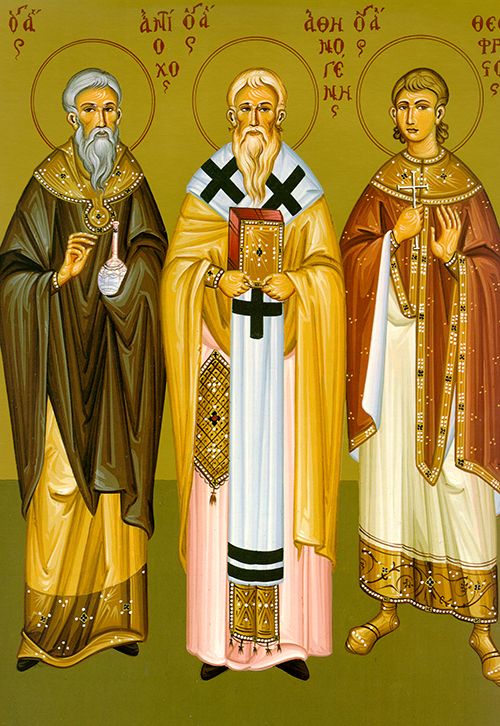

The holy martyr Athenogenes was the bishop of Sebaste in Cappadocia: Christianity was spreading in Sebaste because of the grace-filled preaching of Bishop Athenogenes. When the governor heard that the citizens of Sebaste refused to participate in a festival for idols, he sent soldiers to arrest St. Athenogenes and his disciples. While in prison, St. Athenogenes encouraged his spiritual children for their impending struggle. Led forth to trial, all the holy martyrs confessed themselves Christians and refused to offer sacrifice to idols. After undergoing fierce tortures, the disciples of the holy bishop were beheaded. After the execution of the disciples, the executioners were ordered to torture the bishop. Strengthened by the Lord, Saint Athenogenes underwent the tortures with dignity. His only request was that he be executed in the monastery. Taken to his own monastery, the saint gave thanks to God, and he rejoiced in the sufferings that he had undergone for Him. St. Athenogenes asked that the Lord would forgive the sins of all those who would remember both him and his disciples. The Lord granted the saint to hear His Voice before death, announcing the promise given to the penitent thief: “Today you shall be with Me in Paradise.” The hieromartyr willingly bent his neck beneath the sword.
The holy Athenogenes offered his ten disciples like a sacrifice to the Lord. The shepherd and his sheep entered the heavenly fold. By their work they vanquished the lies of the pagans. O Christ our God, save your flock from the wolves by the prayer of your martyrs.
You heeded the word of the Master and laid down your life for your sheep like a good shepherd. Therefore we bless you, O priest-martyr Athenogenes, and we praise your ten disciples who were guided by fear of God and by your teachings. The Master has crowned you as a friend and set you at his right side in glory. Now pray to Him for all of us.
1 Corinthians 2:9- 3:2
Brothers and sisters: Of wisdom it is written: “Eye has not seen, ear has not heard, nor has it so much as dawned on man what God has prepared for those who love him.” Yet God has revealed this wisdom to us through the Spirit. The Spirit scrutinizes all matters, even the deep things of God. Who, for example, knows a man’s innermost self but the man’s own spirit within him? Similarly, no one knows what lies at the depths of God but God’s Spirit, helping us to recognize the gifts he has given us. We speak of these, not in words of human wisdom but in words taught by the Spirit, thus interpreting spiritual things in spiritual terms. The natural man does not accept what is taught by the Spirit of God. For him, that is absurdity. He cannot come to know such teaching because it must be appraised in a spiritual way. The spiritual man, on the other hand, can appraise everything, though he himself can be appraised by no one. For, (Scripture says,), “Who has known the mind of the Lord so as to instruct him?” But we have the mind of Christ.
Brethren, the trouble was that I could not talk to you as spiritual men but only as men of flesh, as infants in Christ. I fed you with milk, and did not give you solid food because you were not ready for it. You are not ready for it even now, being still very much in a natural condition. For as long as there are jealousy and quarrels among you, are you not of the flesh? And is not your behavior that of ordinary men? When someone says, “I belong to Paul,” and someone else, “I belong to Apollos,” is it not clear that you are still at the human level?
After all, who is Apollos? And who is Paul? Simply ministers through whom you became believers, each of them doing only what the Lord assigned him. I planted the seed and Apollos watered it, but God made it grow. This means that neither he who plants nor he who waters is of any special account, only God, who gives the growth. He who plants and he who waters work to the same end. Each will receive his wages in proportion to his toil.
Matthew 13: 31-36
The Lord told this parable: “The reign of God is like a mustard seed which someone took and sowed in his field. It is the smallest seed of all, yet when full-grown it is the largest of plants. It becomes so big a shrub that the birds of the sky come and build their nest in its branches.”
Jesus offered them still another image: “The reign of God is like yeast which a woman took and kneaded into three measures of flour. Eventually the whole mass of dough began to rise.” All these lessons Jesus taught the crowds in the form of parables. He spoke to them in parables only, to fulfill what had been said through the prophet: “I will open my mouth in parables, I will announce what has lain hidden since the creation of the world.” Then, dismissing the crowds, Jesus went home.
Icon courtesy of Jack Figel, Eastern Christian Publications – ecpubs.com
Tuesday, July 15 –